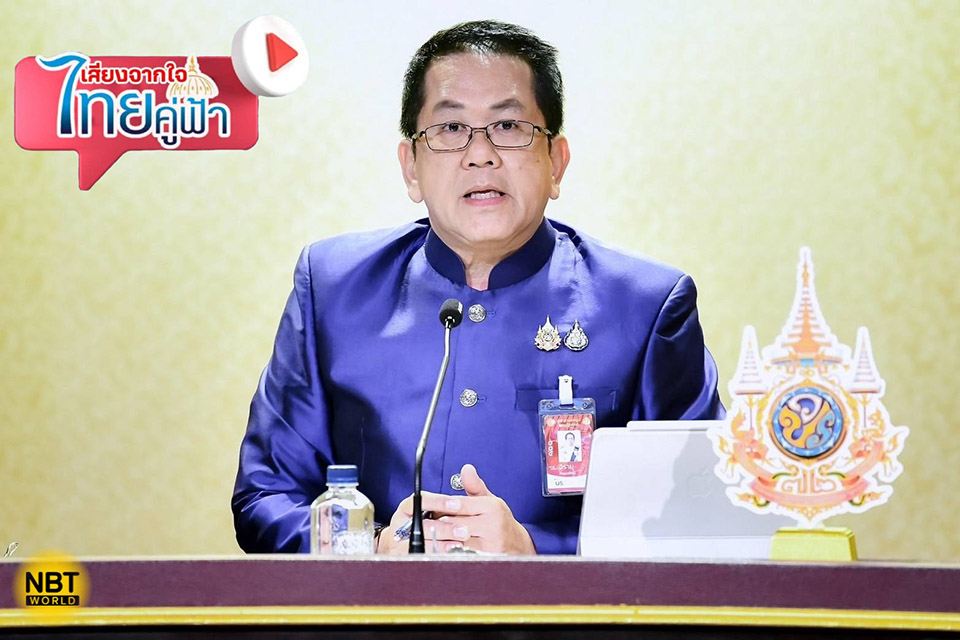
BANGKOK, Thailand – The latest episode of “Voices from Thai Kuh Fah,” presented by Government Spokesperson Jirayu Huangsap, outlined several key initiatives, events, and policy updates from the Thai government.
In anticipation of the 50th anniversary of diplomatic relations between Thailand and China in 2025, the two governments have organized a special religious event to allow Thai citizens to venerate the Buddha Tooth Relic from Beijing. This sacred relic will be displayed at Sanam Luang from December 4, 2024, to February 14, 2025, in honor of both His Majesty the King’s birthday anniversary and the Thai-Chinese diplomatic milestone.
Prime Minister Paetongtarn Shinawatra has announced the first mobile cabinet meeting since her administration began, set for November 29-30 in Chiang Mai and Chiang Rai, where she will also visit key areas, including Mae Sai district. Later this month, she will represent Thailand in international forums, including a summit in China, followed by conferences in the United States and Peru.
On the domestic front, the government addressed recent misinformation about Thai citizenship for ethnic minorities, clarifying that existing policies allow certain ethnic groups with longstanding residency to apply for citizenship. Approximately 350,000 individuals and their 140,000 children are eligible, having been part of government registration since 1992. Those granted citizenship cannot participate in political activities and will undergo biometric verification as a security measure.
Concerns over Thailand’s declining birth rate were also discussed, with the cabinet reporting a drop to 400,000 births in 2022. The trend, combined with a rise in intellectual disabilities among children, has led authorities to encourage prenatal healthcare consultations for expecting families.
Recent Civil and Commercial Code amendments now support equal marriage rights, with inclusive terms like “fiancée” and “spouse” replacing traditional gender-specific language. The change allows same-sex couples to marry and raise children with full legal recognition of parentage and custody.
In response to rising PM2.5 pollution, the prime minister directed Deputy Prime Minister Prasert Jantararuangtong and the Ministry of Natural Resources and Environment to introduce measures, including discouraging purchases from burned fields and tightening emissions regulations for industries and vehicles.
The Ministry of Commerce and the Ministry of Digital Economy and Society were directed to enforce quality standards for online products, requiring foreign vendors to register in Thailand and comply with VAT and product standards by December 1, 2024. Imported items, especially cosmetics and consumables, must meet Thailand’s Industrial Standards Institute (TISI) and FDA regulations.
Economic discussions took place in a meeting between the prime minister and the Joint Private Sector Committee (JPSC), involving the Thai Chamber of Commerce, Federation of Thai Industries, and Thai Bankers’ Association. The discussions focused on support for small and medium enterprises (SMEs), water resource management, and strategies for economic recovery, with proposals to continue the government’s co-payment program and to provide debt relief for households and support for commercial vehicle owners.
The National Economic and Social Development Council projected Thailand’s GDP growth at 2.3% to 2.8% in 2024, driven by a recovering tourism sector, increased domestic spending, and ongoing government investment.
In tourism, the prime minister launched the “Thailand Winter Festivals” program to attract visitors during winter and support year-round tourism. The “Northern Travel Co-Pay” campaign, which began on November 1, 2024, provides a 50% discount to tourists visiting 17 northern provinces, with 10,000 discounts available.

Following recent flooding and landslides in Chiang Mai and Chiang Rai, the prime minister instructed local authorities to extend additional support to affected residents. During her visit to Roi Et province yesterday (Nov 1), Paetongtarn reaffirmed the government’s commitment to combating drug-related issues. Thailand is working with ASEAN countries on cross-border drug control, with anti-narcotics representatives stationed in five neighboring countries to address the sources of trafficking.
Paetongtarn is scheduled to attend the 8th Mekong Economic Cooperation Summit in Kunming, China, from November 6-7, where regional development, connectivity, and shared challenges such as flooding and water management across the Mekong region are expected to be discussed.








